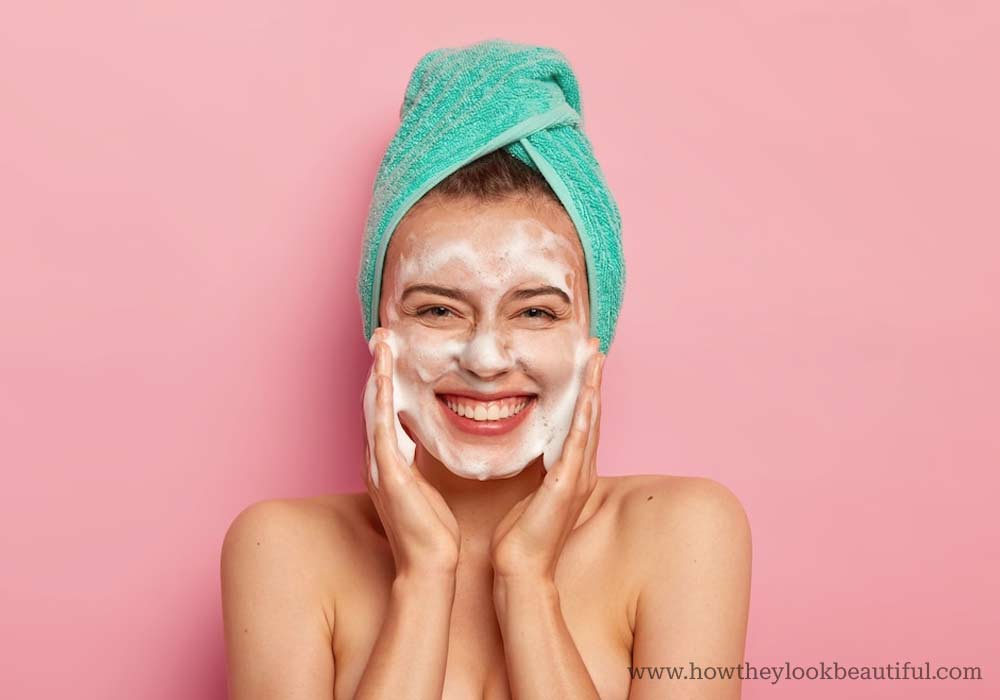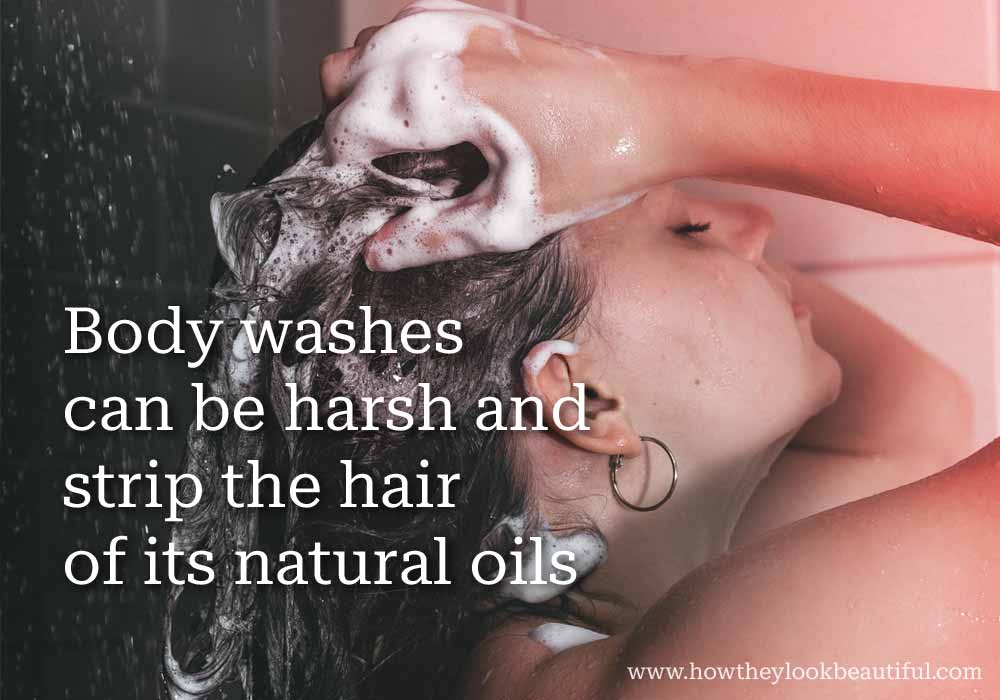Can you use body wash on your face? It’s a question that many people have asked, and for good reason. The body wash is designed to cleanse the entire body, so it stands to reason that it could work just as well on the face. However, a few things to consider before using body wash on your face. Most people think that soap and body wash are the same thing. They are not. The body wash is made to clean the body. Soap or face is made to clean the face.
Should You Use Body Wash on Your Face?
Body washes tend to be harsher than face wash. They often contain ingredients that strip away natural oils, leading to dryness and irritation. The potential harsh effects of body wash on the face skin are a good reason not to use it on your face.
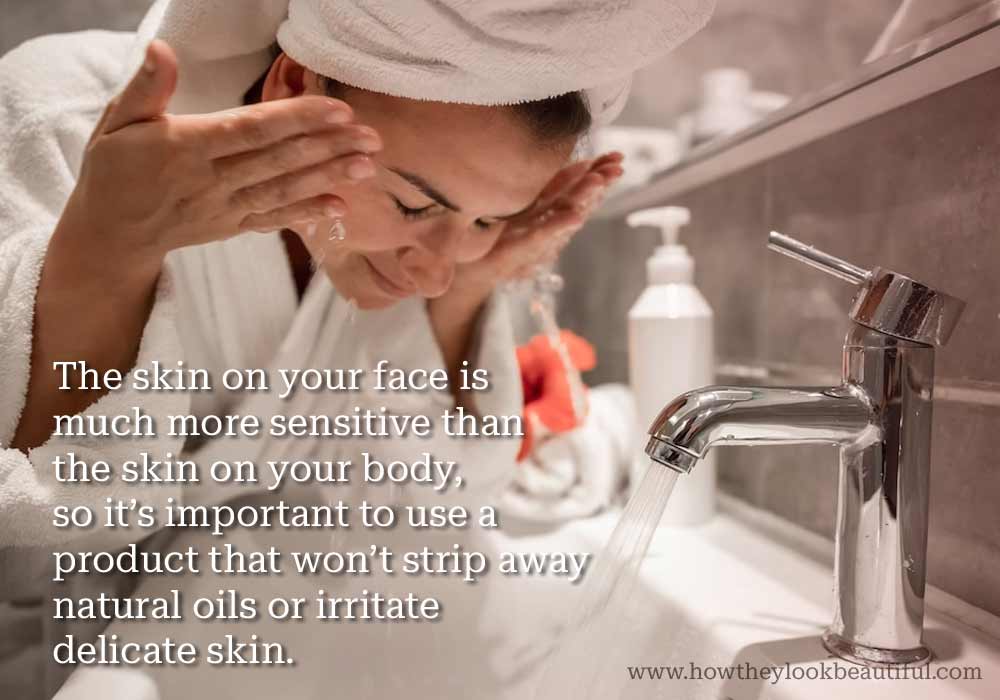
Body Wash Vs Face Wash
Different types of soaps are designed for different purposes. Body wash and face wash – both have their benefits, but there are some key differences to consider. The body wash is typically formulated to cleanse the entire body, while the face wash is designed specifically for the face. The face wash is often more gentle on the skin and includes ingredients that can help to improve specific skin concerns, like acne. Body wash can be harsher and may not include these targeted ingredients. The body wash isn’t necessarily designed to clean your face as effectively as a face soap, so it might not remove all of your makeup or dirt.
The Chemistry Behind Cleansers
Most soaps have anionic surfactants (commonly sodium lauryl sulfate or SLS). That means they have a negative charge. Positively charged surfactants (cationic surfactants) in soap or face wash can cause skin irritation, therefore, people with sensitive skin and acne-prone skin should avoid cleansers having these types of surfactants. Cationic surfactants are mostly used in haircare products as conditioning agents. Amphoteric surfactants on the other hand having a neutral charge and Non-ionic surfactants having no charge are mild on the skin, though they may not perform as well as their sulfate counterparts and may not foam as much as surfactants with sulfates.
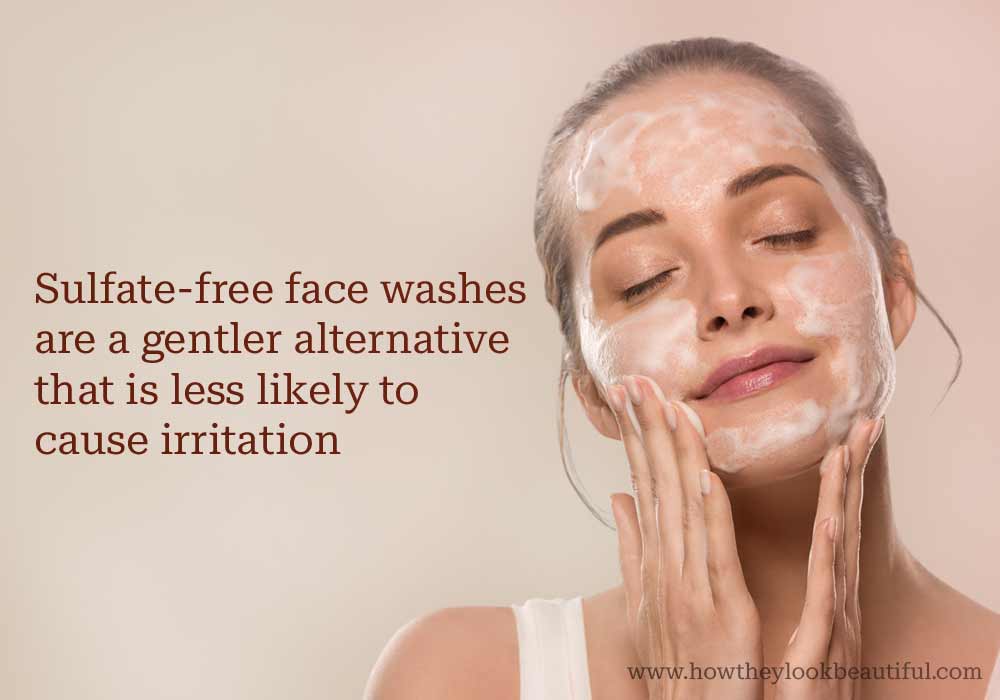
What Are Sulfate-free Surfactants?
Sulfate-free surfactants are a type of surfactant that does not contain any sulfates. Sulfates are a common ingredient in many cleaning products (Sodium Lauryl Sulfate or SLS), but they can be harsh and dry to the skin. Sulfate-free surfactants are a gentler alternative that is less likely to cause irritation. These surfactants are just as effective as their sulfate-containing counterparts, making them a great choice for those with sensitive skin.
Sulfated and sulfonated surfactants have a much lower price than amphoteric and non-ionic surfactants which are mild on the skin. This is the reason cleansers having sulfated and sulfonated surfactants have lower prices than sulfate-free cleansers or shampoos. Sulfate-free cleansers don’t have alcohol sulfates but surfactants derived from natural substances. At present, it is challenging to produce 100% natural, high-performance, cost-effective sulfate-free surfactants that replace traditional surfactants, but surfactants can be derived from natural feedstocks such as coconut and palm oils. Products like SLSA (sodium lauryl sulfoacetate), Sodium Cocoyl Glycinate, Disodium / Sodium Cocoyl Glutamate, Decyl glucoside, and Lauryl glucoside are some safer alternatives in your cleansers. Sulfate-free products may also contain Alkyl Ether Carboxylates which are much milder than sulfates.
Some Popular Sulfate-Free Face Washes & Cleansers & Their Ingredients
| Sr. No. | Brand | Ingredients | Best for Skin Type | Natural Ingredients | Essential oils | Special Features |
|---|---|---|---|---|---|---|
| 1 | ZELEN Life Cleanser | Water, Glycerin, Cetyl Alcohol, Glyceryl Stearate (SE), Sunflower Seed Oil, Coconut Unfractionated Oil, Sweet Almond Oil, Jojoba Seed Oil, Lemon Peel Oil, Sodium Stearoyl Lactylate, Phenoxyethanol, Dehydroacetic Acid, Tocopherol, Benzyl Alcohol, Lavender Flower Oil, Geranium Flower Oil, Bay Leaf Oil, Aloe Vera Oil, Citric Acid, Rose Flower Oil. *Limonene, *Linalool, *Citronellol, *Geraniol, *Citral. (*Natural component of essential oils) | All skin types | Jojoba, aloe vera, sunflower | Yes | Made by hand |
| 2 | CeraVe Foaming Face Wash | Water, Cocamidopropyl Hydroxysultaine, Glycerin, Sodium Lauroyl Sarcosinate, Peg-150 Pentaerythrityl Tetrastearate, Niacinamide, Peg-6 Caprylic/Capric Glycerides, Sodium Methyl Cocoyl Taurate, Propylene Glycol, Ceramide Np, Ceramide Ap, Ceramide Eop, Carbomer, Methylparaben, Sodium Chloride, Sodium Lauroyl Lactylate, Cholesterol, Disodium Edta, Propylparaben, Citric Acid, Tetrasodium Edta, Hydrolyzed Hyaluronic Acid, Phytosphingosine, Xanthan Gum | Normal to Oily Skin | No | No | No Synthetic Fragrance, contains hyaluronic acid, Contains Ceramides |
| 3 | Boscia Purifying Cleansing Gel | Water, Disodium cocoyl glutamate, Diglycerin, Hydrogenated starch hydrolysate, Sodium cocoyl glycinate, Butylene glycol, Methyl gluceth-10, Sodium cocoyl glutamate, Acrylates/steareth-20 methacrylate copolymer, Sodium lauroyl glutamate, Tea of Heaven leaf extract, tea oil camellia leaf extract, rosemary leaf extract, Pelargonium graveolens flower oil, jojoba seed extract, Great Willow herb flower/leaf/stem extract, Citric acid, Glycerin, 1,2-hexanediol, Caprylyl glycol, Cellulose gum, Sclerotium gum, Trisodium ethylenediamine disuccinate, Polysorbate 20 | Normal, Dry, Combination, and Oily | Tea of Heaven, Tea oil Camellia, rosemary, Rose geranium, Jojoba, Great Willow herb | Yes | No harsh scent |
| 4 | La Roche-Posay Toleriane Hydrating Gentle Face Cleanser (made in France) | Water, Glycerin, Pentaerythrityl Tetraethylhexanoate, Propanediol, Ammonium Polyacryloyldimethyl Taurate, Polysorbate 60, Ceramide Np, Niacinamide, Sodium Chloride, Coco-Betaine, Disodium Edta, Caprylyl Glycol, Panthenol, Tocopherol | Normal to Dry Skin | No | No | Maintains the natural moisture barrier and pH |
Some of the Sulfate-free Surfactants Which Are Naturally Derived and Mild
- Alkyl ether carboxylates
- Alpha olefin sulfonates
- Alkyl benzene sulfonates
- Sulfosuccinates
- Alkylamphoacetates
- Betaines
- Sultaines
- Acylisethionates
- Acyl methyl isethionates
- Acyl methyl taurates
- Acyl sarcosinates
- Acyl glycinates
- APGs
- Alcohol ethoxylates
- Sulfoacetates
- Fatty acid soaps
Popular Sulfate-Free Anionic Surfactants
- Sodium Lauroyl Methyl Isethionate (Derived from coconuts)
- Sodium Cocoyl Isethionate (Derived from coconuts)
- Sodium Lauryl Sulfoacetate (Derived from coconut and palm oils)
- Sodium Laureth Sulfosuccinate (Derived from coconut or MB palm)
Natural Surfactant Comparison Table
| Sr. No. | Surfactant | Properties | pH |
|---|---|---|---|
| 1 | Coco glucoside | very mild – has good foam stabilizing quality – has good hydrating properties – biodegradable | ∼11.5 – 12.5 |
| 2 | Decyl glucoside | biodegradable – excellent and stable foam – works very well with Cocamidopropyl betaine. This is the best in terms of foam out of all five natural surfactants | ∼11.5 – 12.5 |
| 3 | Lauryl glucoside | very mild – moderate foaming – excellent viscosity builder – good in baby cleansing products – biodegradable | ∼11.5 – 12.5 |
| 4 | Sucrose cocoate | mild – increases foam density & viscosity – adds creaminess – has good re-fatting qualities – moisturising and anti-static – biodegradable | ∼6.5-7.5 |
| 5 | Caprylyl/Capryl glucoside | creates fine and stable foam – mild – good solubiliser for essential oils – biodegradable | ∼11.5 – 12.5 |
How soap is made
Soap is made by combining fats or oils and lye (sodium hydroxide). The process is called saponification, and it produces soap molecules and glycerin. The soap molecules are what actually clean your skin or laundry, and the glycerin is a valuable by-product that helps to keep things moisturized.
Soaps can be made from many different kinds of fats and oils, including animal fats, vegetable oils, or marine oils. Each type of fat or oil produces a different kind of soap with different properties. For example, coconut oil soap is very good at cleaning oily skin, while olive oil soap is more gentle and works well on sensitive skin.
What is Body Wash
Body washes are a type of soap that is designed to be used on the body only (not the face). They usually contain moisturizing ingredients like glycerin or aloe vera that help to keep the skin from drying out.
Many people think that body washes are harsh and drying, but that’s not necessarily true. In fact, some body washes can be beneficial for your skin. Exfoliating body washes can help to exfoliate your skin, remove dead skin cells, and leave your skin feeling clean and refreshed.
The body wash is a product that is designed to cleanse the body and remove dirt, oil, and sweat. It is usually used in the shower in place of soap. Body wash often has a gel-like consistency and may contain moisturizers, exfoliants, and other skin-care ingredients.
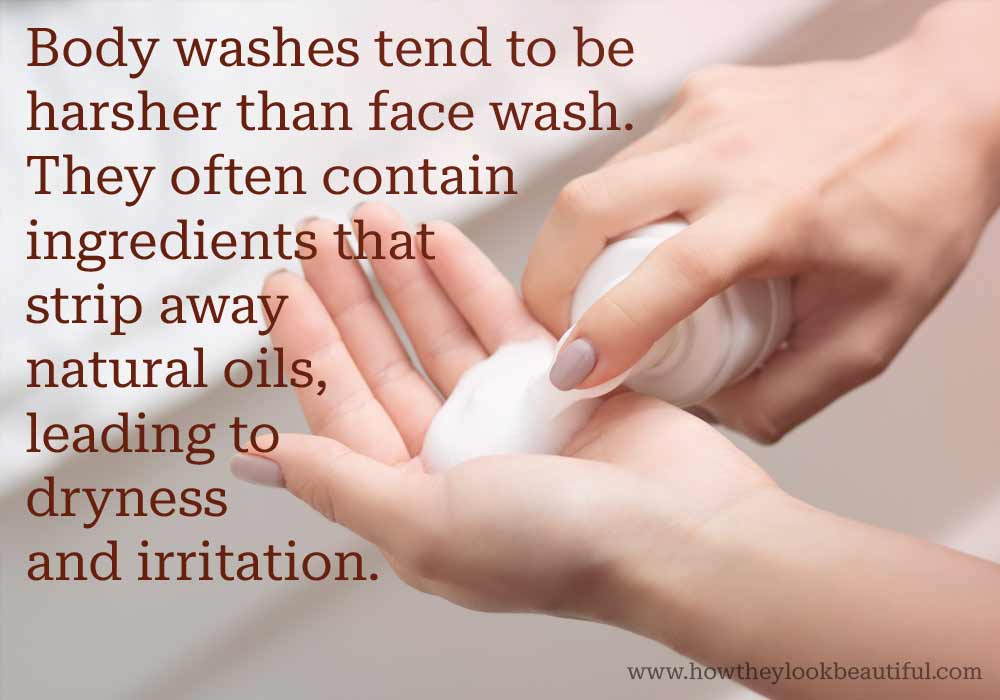
What If You Want to Use Body Wash on Your Face?
Most body washes are safe to use on the face, but it is important to choose one that is designed for gentle cleansing. Look for a body wash labeled “for sensitive skin” or “for all skin types”. Avoid body washes that contain harsh cleansers or exfoliants, as these can irritate the skin of your face.
It is safe to use body wash on your face, but you may find that it is not as effective as a facial cleanser. The body wash is designed to cleanse the skin of dirt and debris, but it may not be able to remove all of your makeup or deep clean your pores as effectively as a facial cleanser. Dont use it regularly.
How is a body wash different from soap?
The body wash is a type of cleansing product that is designed specifically for use on the body. Soap, on the other hand, is designed for general purpose use or on the hands. Choosing a liquid cleanser specially designed to clean facial skin is better than using the typical bar soap. Both body wash and soap can be used to cleanse the skin, but they are not interchangeable.
The body wash is generally more moisturizing than soap because it contains added ingredients that help to replenish the skin’s natural oils but are not sufficient enough to prevent or treat dry skin on their own. Soap can be drying, especially if it contains fragrances or other harsh chemicals and ingredients used to make them foamy.
Is Body Wash Good for Your Face?
Washing your face with a body wash can work just as well as any other type of cleanser, although you may want to choose one that’s specifically designed for your face if you have sensitive skin. You need to be careful about the kind of body wash that you use. Some body washes can be very drying to the skin, so you need to make sure that you choose a body wash designed for sensitive skin if you are using it to wash your face.
Body washes can be a great way to exfoliate your skin, but be sure to choose one with small beads or granules so you don’t damage your delicate facial skin. Just make sure to choose a body wash that is gentle and has moisturizing properties. If you are looking for an all-in-one product, some body washes can double as face cleansers. These types of body washes are typically made with more gentle ingredients and often contain added benefits like antioxidants or exfoliating properties.
Face Wash
The face wash is a cleanser that is specifically formulated for the face. It is usually milder than body wash and is designed to remove dirt, oil, makeup, and other impurities from the facial skin. Face wash can be used on all skin types, including sensitive skin. Some face washes also contain ingredients that can help to improve the appearance of the skin, such as glycerin or hyaluronic acid.
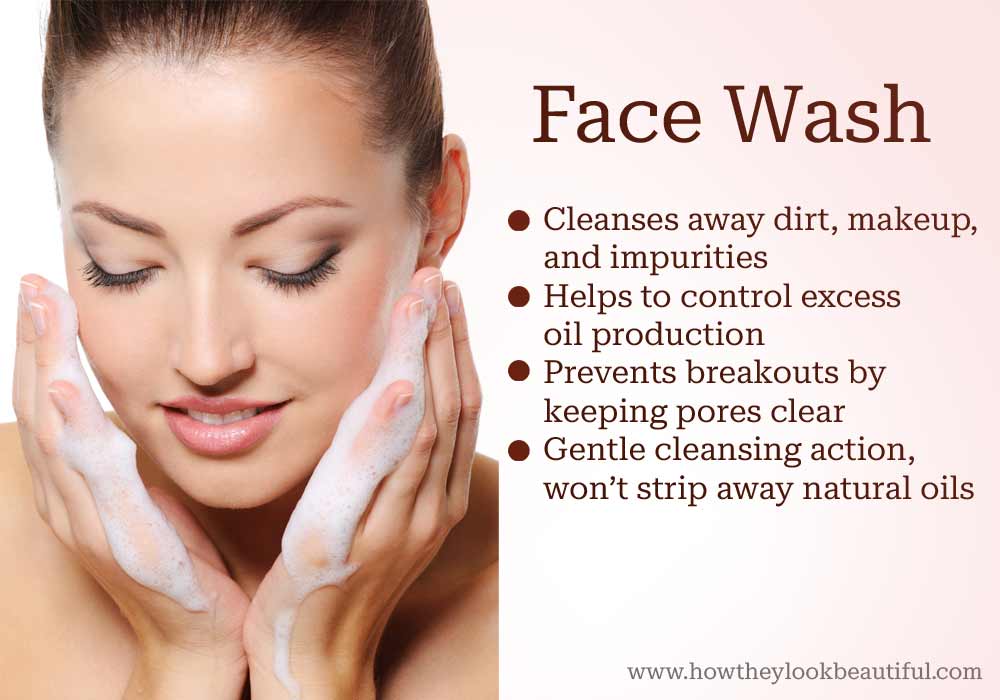
How is Face Wash Different From Body Wash?
Body wash is typically made with harsh chemicals and sulfates that can strip your skin of its natural oils. Using body wash on your face can leave your skin feeling dry, tight, and irritated. Face wash is made with gentler ingredients that are designed to cleanse your face without stripping it of its natural oils.
There are many benefits of using a face wash, including:
- Cleansing away dirt, makeup, and impurities
- Helping to control excess oil production
- Preventing breakouts by keeping pores clear
- Gentle cleansing action won’t strip away natural oils
- Boosting circulation for a healthy glow
- Refreshing and invigorating the skin
Facial Cleansers Vs Face Wash Vs Facial Scrubs
Many people often get confused between facial cleansers and facial scrubs. Facial scrubs are specifically used to exfoliate the skin, which is done by using a physical scrubbing motion. Scrubs contain gritty particles that are designed to remove dead skin cells, dirt, or any other debris from your face. They are more abrasive and should be used only on oily or acne-prone skin. While facial cleansers also contain exfoliants, they are not physical but chemical. The exfoliants in facial cleansers are designed to remove dead skin cells, dirt, or any other debris from your face. Facial cleansers are typically gentle and can be used on all skin types. They remove makeup and dirt without stripping the skin of its natural oils. Facial cleansers are designed to not only remove light makeup but also cleanse the skin.
In addition, facial cleansers are not to be confused with face washes. Face washes are designed to remove makeup and clean your pores more deeply.
Can You Use a Facial Cleanser on Your Body?
Yes, you can use facial cleanser on your body! In fact, many people do and you may feel it can be a great way to get both your face and body clean in one go. In fact, it may be better for your skin than using soap. Facial cleansers often contain more moisturizing ingredients than body washes. Facial cleansers are designed to be gentle on the skin and to remove dirt, oil, and makeup without stripping the skin of its natural oils. Soap can be harsh and drying, especially on the face.
But is it really the best product for the job? Facial cleansers are designed to cleanse the delicate skin on your face, so they are often more gentle than body washes and soaps. However, they may not be as effective at cleansing your body because they are not as concentrated. Body washes, on the other hand, are designed for use on tougher skin, like the skin on your legs and arms. When in doubt, it’s always best to stick with a product that is specifically designed for use on the body.
Frequently Asked Questions
It all depends on your skin type and what works for you. If you have oily skin, it’s best to wash your face twice a day because oil buildup can cause acne, especially if you have an oily T-zone (forehead, nose, and chin). If you have dry skin, it’s best to wash your face once at night, which should be sufficient. Washing your face with soap too often can cause more damage than good because the soap can strip away too much oil and moisture from your skin.
Conclusion
Face wash and body wash are two different types of products that people use to clean their face and body respectively. Overall, body washes are designed for use on the body and face washes are designed specifically to cleanse the face. People with oily, dry, or sensitive skin should use a facial wash. People with normal skin can use both products. The skin on your face is much more sensitive than the skin on your body, so it’s important to use a product that won’t strip away natural oils or irritate delicate skin of your face
Hope you find this detailed article helpful in choosing your face wash.

Hi, I’m Annie,
What drives me is the ability to empower women by cultivating the self-confidence in their inner beauty, enhancing their self-image, and showing them that overall beauty needn’t be either difficult or costly and that they can seamlessly mould their style to suit their everyday needs, without having to make an either / or choice. I’m constantly surprised at every transformation and it drives me on to the next. My knowledge is enhanced by 18 years of hands-on experience, and learning from every new assignment.
When I’m not writing beauty advice for my blog, I’m consulting on make-up, hair, diet and style. Or I’m just kicking back my heels cuddling with my fat Lab, Coco.
